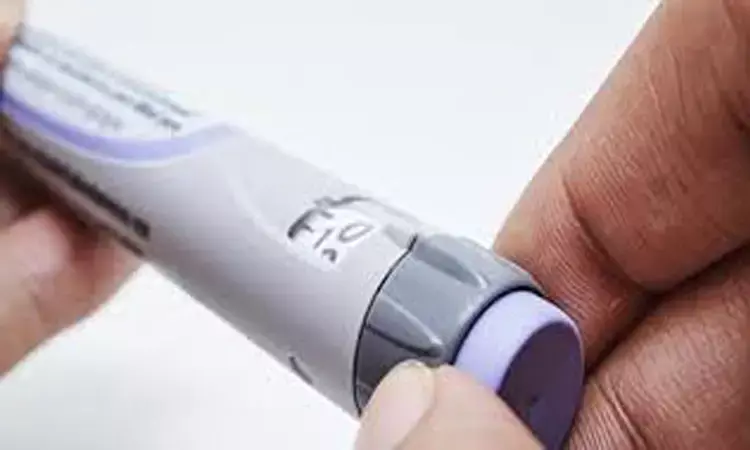- Home
- Medical news & Guidelines
- Anesthesiology
- Cardiology and CTVS
- Critical Care
- Dentistry
- Dermatology
- Diabetes and Endocrinology
- ENT
- Gastroenterology
- Medicine
- Nephrology
- Neurology
- Obstretics-Gynaecology
- Oncology
- Ophthalmology
- Orthopaedics
- Pediatrics-Neonatology
- Psychiatry
- Pulmonology
- Radiology
- Surgery
- Urology
- Laboratory Medicine
- Diet
- Nursing
- Paramedical
- Physiotherapy
- Health news
- Fact Check
- Bone Health Fact Check
- Brain Health Fact Check
- Cancer Related Fact Check
- Child Care Fact Check
- Dental and oral health fact check
- Diabetes and metabolic health fact check
- Diet and Nutrition Fact Check
- Eye and ENT Care Fact Check
- Fitness fact check
- Gut health fact check
- Heart health fact check
- Kidney health fact check
- Medical education fact check
- Men's health fact check
- Respiratory fact check
- Skin and hair care fact check
- Vaccine and Immunization fact check
- Women's health fact check
- AYUSH
- State News
- Andaman and Nicobar Islands
- Andhra Pradesh
- Arunachal Pradesh
- Assam
- Bihar
- Chandigarh
- Chattisgarh
- Dadra and Nagar Haveli
- Daman and Diu
- Delhi
- Goa
- Gujarat
- Haryana
- Himachal Pradesh
- Jammu & Kashmir
- Jharkhand
- Karnataka
- Kerala
- Ladakh
- Lakshadweep
- Madhya Pradesh
- Maharashtra
- Manipur
- Meghalaya
- Mizoram
- Nagaland
- Odisha
- Puducherry
- Punjab
- Rajasthan
- Sikkim
- Tamil Nadu
- Telangana
- Tripura
- Uttar Pradesh
- Uttrakhand
- West Bengal
- Medical Education
- Industry
Insulin Degludec: A Safer, More Effective Option for Managing Critical Illness Hyperglycemia, Study Finds

Egypt: A recent study published in the Indian Journal of Critical Care Medicine has compared the efficacy of ultra-long-acting insulin degludec with the commonly used insulin glargine in managing glycemic control in critically ill patients. The findings suggest that insulin degludec can be an effective alternative to regular insulin for controlling blood sugar levels in patients experiencing critical illness-related hyperglycemia.
"Ultra-long-acting insulin effectively controls random blood sugar (RBS) levels while reducing the overall insulin dose required. Insulin degludec is recommended as a safe and efficient alternative to regular insulin for managing glycemic control in critically ill patients," the researchers wrote.
The researchers note that stress hyperglycemia, or critical illness hyperglycemia, is common among critically ill patients, and managing it is vital, as hypoglycemia can lead to poor outcomes such as higher mortality, prolonged ICU stays, and increased risk of infections. Stress hyperglycemia is driven by factors like the hypothalamic-adrenal axis, sympathetic system, and proinflammatory cytokines, along with insulin resistance. While short-acting insulin is typically used for hyperglycemia in unstable patients, it carries a high risk of hypoglycemia. Long-acting insulins, like insulin glargine and degludec, offer more stable glucose control with a lower risk of hypoglycemia, making them beneficial for managing critical illness hyperglycemia.
Against the above background, Ibrahim Mohammed El Sherif, Department of Anaesthesia, ICU and Pain Management, Faculty of Medicine, Ain Shams University, Cairo, Egypt, and colleagues sought to evaluate the effectiveness of insulin degludec, insulin glargine, and regular insulin in managing blood sugar levels in patients with critical hyperglycemia.
For this purpose, the researchers conducted a randomized controlled trial in which patients were randomly assigned to one of three equal groups—Group R, Group G, and Group D. Each group comprised 30 patients. Group G received regular insulin alongside insulin glargine, Group D was treated with regular insulin and insulin degludec, while Group R was managed using only regular insulin. All patients completed the study.
Key findings include:
- There were no significant differences between the three groups regarding age, APACHE score, RBS on admission, ICU stay, hospital stay, serum levels, HbA1c, average plasma glucose, and time to glucose control.
- Kaplan–Meier analysis showed no significant difference in the time to reach target plasma glucose levels across the groups.
- Group R required significantly more insulin to reach target levels than Groups G and D.
- ANOVA showed that the total insulin dose was significantly higher in Group R (122.32 ± 28.6) than in Groups G (18.52 ± 6.2) and D (17.68 ± 4.5).
- Hypoglycemia incidence was higher in Group R compared to Groups G and D.
"The findings indicated that long-acting and ultra-long-acting insulin was more effective than regular insulin in controlling random blood sugar. These insulin types also reduced the total insulin dose required and lowered the incidence of hypoglycemia without affecting the length of ICU stay," the researchers concluded.
Reference:
El Sherif IM, Haggag AM, Abbas MH, Kamel WY. Insulin Degludec vs Insulin Glargine for Glycemic Control in Critical Illness Hyperglycemia. Indian J Crit Care Med 2025;29(1):52–58.
Dr Kamal Kant Kohli-MBBS, DTCD- a chest specialist with more than 30 years of practice and a flair for writing clinical articles, Dr Kamal Kant Kohli joined Medical Dialogues as a Chief Editor of Medical News. Besides writing articles, as an editor, he proofreads and verifies all the medical content published on Medical Dialogues including those coming from journals, studies,medical conferences,guidelines etc. Email: drkohli@medicaldialogues.in. Contact no. 011-43720751


